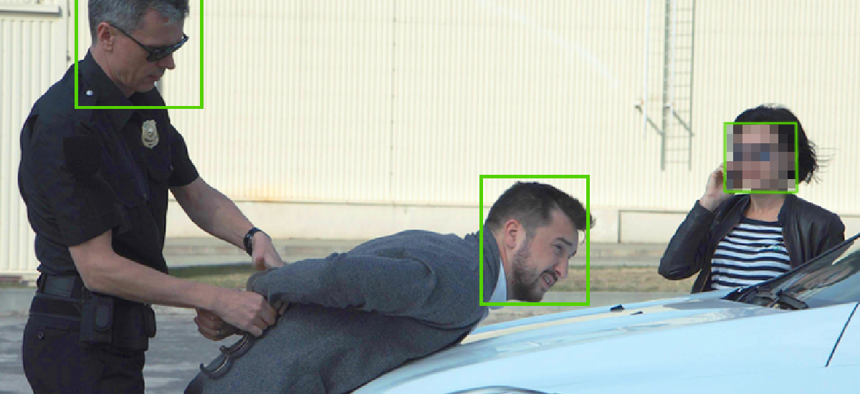How AI technology helps police protect citizens’ identities


Connecting state and local government leaders
Redaction solutions powered by artificial intelligence can identify blur items of interest within the video, from license plates to human faces in minutes.
Police body cameras have grabbed headlines and national attention in unprecedented ways during the past few years. While the cameras’ efficacy has yet to be proven, they have gained widespread support; 74% of Americans believe body-camera policies equally protect both the police officers who wear them and the citizens who interact with the police.
Yet a few roadblocks have prevented some police departments from implementing the cameras. Of the police departments in the U.S. that have not created a program, 77% cited costs, while 39% pointed to privacy concerns, including times when domestic violence victims and the mentally ill are captured on video.
With the help of artificial intelligence, both cost and privacy concerns now can be assuaged. AI-based solutions are poised to usher in a new era of transparency and efficiency to law enforcement agencies. Here’s how:
The problem: Video editing is costly, time-consuming work
In the interest of protecting victims and innocent bystanders, police departments edit videos to blur out faces before they can be released to the public. But with most technology solutions, that’s not a one-click process. A police officer must scan through a video frame by frame; a five-minute video might take 50 minutes to edit, per face -- time and money that could be better spent elsewhere.
And the pressure to release these videos more quickly is mounting. A California law that goes into effect July 1 requires police departments to release most body-worn camera and other video recordings of officer shootings and serious uses of force within 45 days of the incident. Other states likely will monitor the efficacy of the law closely and may follow suit with their own bills, while some, including Ohio, Nevada, and Florida already have their own versions on the books.
How AI solves it: Instead of manually erasing content frame by frame, AI-enabled redaction solutions can identify and produce a chronological list of potential items of interest within the video, from license plates to human faces. Police officers then check the box next to the item of interest they want to eliminate, and the software removes each one systematically. Work that previously consumed hours of expensive labor can be reduced to mere minutes.
Police departments aren’t the only ones who stand to benefit from this cost reduction; in some states, prosecutors also are shouldering the burden. Wayne County, Mich., prosecutors were hit with $2.5 million in personnel costs -- nearly an 8% annual budget hike -- for work preparing videos to be presented as evidence at trial once body camera evidence came into play. That massive figure could be drastically reduced with the use of AI solutions.
The problem: Concerns over victim and bystander privacy
If a couple is walking down the street and are suddenly mugged and seriously injured, both the couple and the culprit potentially would be captured by a police camera. To publicly release information, how can police ensure the victims are fully erased from the video — and that their identities and personal information aren’t compromised in the process?
How AI solves it: AI-based video redaction applications use a form of pattern matching to identify objects within video footage. Much like the scanner at the local grocery store knows what a barcode “looks like” on a box of cereal, redaction applications are pre-trained to know what a human head or a license plate looks like, too. Once an object is detected, the operator of the application can easily bulk select the item to be blurred throughout the video clip. Once a redaction takes place, it’s as the person’s face was never filmed in the first place, and no identity is attached.
In order for police to ensure erasure completion and accuracy, AI software users can scroll through the video’s asset list to skip to key moments and ensure faces and other information has successfully been redacted. The actual redaction controls are still very much in the hands of the editing police officers and should be thought of as helpful tools that merely expedite and classify information, aiding officers to more efficiently complete an otherwise arduous, labor-intensive process.
Unlike complex technologies that may require hours of training, AI-powered video redaction solutions simply build on the redaction processes police departments have used for years. With these technologies in place, officers can trust that crucial information is kept safe, while also promoting transparency by releasing information quickly and protecting citizens’ privacy -- a forward-thinking shift that has the potential to benefit countless lives.
NEXT STORY: Data-driven space exploration




